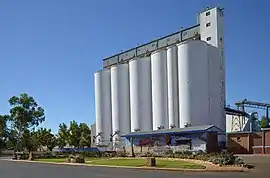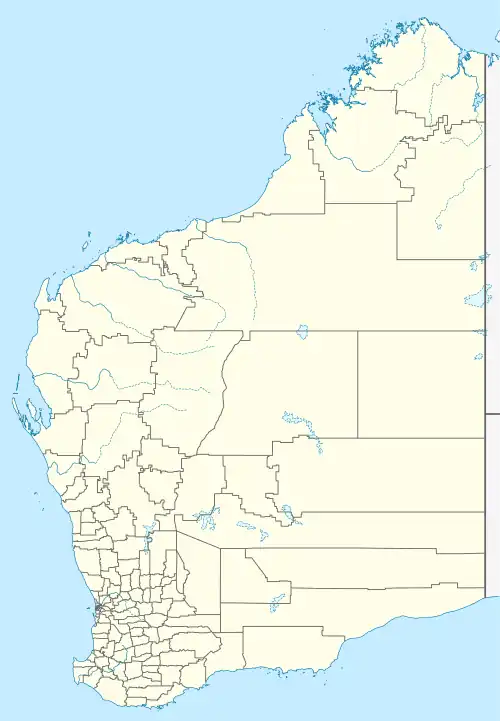Three Springs, Western Australia
Three Springs is a town located 313 kilometres (194 mi) north of Perth, Western Australia on the Midlands Road, which until the opening of the Brand Highway in 1975 was the main road route from Perth to the state's north. The town is the seat of the Shire of Three Springs. Its economy is based on agriculture (mainly broad acre grain cropping and sheep farming) and mining.
| Three Springs Western Australia | |||||||||
|---|---|---|---|---|---|---|---|---|---|
 Three Springs railway station and grain silo, 2013. | |||||||||
 Three Springs | |||||||||
| Coordinates | 29°32′00″S 115°45′42″E | ||||||||
| Population | 356 (SAL 2021)[1][2] | ||||||||
| Established | 1906 | ||||||||
| Postcode(s) | 6519 | ||||||||
| Elevation | 257 m (843 ft) | ||||||||
| Area | 1.2 km2 (0.46 sq mi) | ||||||||
| Location | |||||||||
| LGA(s) | Shire of Three Springs | ||||||||
| State electorate(s) | Moore | ||||||||
| Federal division(s) | Durack | ||||||||
| |||||||||
History
The first Europeans to pass near the Three Springs area were government Assistant Surveyor Augustus Charles Gregory and Francis Thomas Gregory (both attached to the department of the Surveyor-General) and their brother Henry Churchman Gregory, on a public-private funded expedition to search for new agricultural land beyond the settled areas. On 14 September 1846 they camped at Eneabba Springs, 40 kilometres (25 mi) southwest of Three Springs, while returning to Perth from the Irwin River.[4] In 1867, government Assistant Surveyor Charles Cooke Hunt, while undertaking a road survey recorded the words "Three Springs" at the site of the current town after some nearby springs. The name began to appear on official maps from then on and land in this region was soon taken up as pastoral leases.
In 1895 the Midland Railway was built under a land grant scheme from Midland Junction to Walkaway. Under the land grant scheme the railway consortium was able to select land within 40 miles (64 km) of the new railway. Three Springs was a siding on the line. In 1907 the government declared a townsite adjacent to the railway siding, gazetted as Kadathinni in 1908.[5] It was also intended to change the name of the station when the townsite was named, but this was overlooked, and it remained Three Springs. The townsite was also locally known as Three Springs, and in 1946 the name was officially changed to Three Springs to conform with local usage.[6]
In 1932 the Wheat Pool of Western Australia announced that the town would have two grain elevators, each fitted with an engine, installed at the railway siding.[7]
Flora
Banksia trifontinalis (Three Springs Dryandra) is named after the town, in the vicinity of which it was first collected.[8]
Economy

.jpg.webp)
.jpg.webp)
.jpg.webp)
Three Springs' economy is built on mining and agriculture, including broad acre grain cropping and sheep farming, as well as cattle, pigs and wildflower intensive farming.
Imerys S.A. a French industrial minerals company, operates the world's second largest talc mine just outside the Three Springs townsite. Up until 2004, the talc was railed to Geraldton for export. As a result of contamination from iron ore at the port rail unload facility, since 2004 it has been transported by road.[9]
Notable residents
- James “Jimmy” Gardiner (1861-1928) - served as local member in the Legislative Assembly of Western Australia, colonial treasurer, inaugural state leader of the Country Party, Speaker of the Legislative Assembly, chairman of the Western Australian Cricket Council, president of the Western Australian Cricket Association, founding Vice President of the Kadathinni Cricket Club, Inaugural Patron of the Three Springs Race Club, Inaugural Vice President of the Three Springs Rifle Club.
- Patrick Lynch (1867-1944) - State Minister for Works, federal Minister for Works and Railways, President of the Senate, farmer.
References
- Australian Bureau of Statistics (28 June 2022). "Three Springs (Suburb and Locality)". Australian Census 2021 QuickStats. Retrieved 28 June 2022.
- Australian Bureau of Statistics (28 June 2022). "Three Springs (Suburb and Locality)". Australian Census 2021.
- "Summary statistics Carnamah". Climate statistics for Australian locations. Bureau of Meteorology. Retrieved 29 February 2020.
- Gregory, Augustus Charles; Gregory, Francis Thomas (1884). Journals of Australian Explorations. Brisbane: James C. Beal, Government Printer. Retrieved 6 June 2019.
- Jarvis, Neil (1986) Western Australia, an atlas of human endeavour Perth, W.A.: Dept. of Lands and Surveys in association with the Education Dept. of Western Australia 2nd ed. ISBN 0-7309-0082-7 Previous ed.: Perth, W.A.: Government Printer, 1979. p. 46
- "History of country town names – T". Western Australian Land Information Authority. Archived from the original on 14 March 2022. Retrieved 11 February 2007.
- "Country elevators". The West Australian. Perth: National Library of Australia. 6 July 1932. p. 10. Retrieved 6 April 2013.
- George, A.S. (1996). "New taxa and a new infrageneric classification in Dryandra R. Br. (Proteaceae: Grevilleoideae)". Nuytsia. Como, Western Australia: Western Australian Herbarium Department of Conservation and Land Management. 10 (3): 322. ISSN 0085-4417. Retrieved 28 February 2020.
- Randall, Ric; Mackin, Geoff (7 November 2018). "WA's Road Transport Industry Safety Forum" (PDF). Mid West Ports. p. 8. Retrieved 28 February 2020.